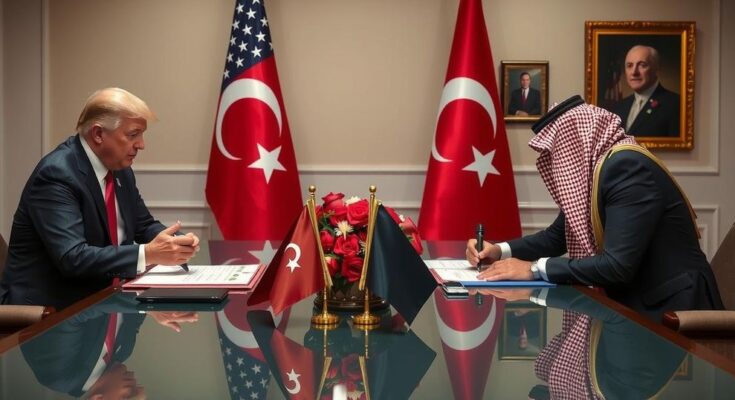Officials from the US, Turkey, and Arab nations have pledged to support a peaceful transition in Syria, aiming for an inclusive government and stability amidst regional fears of chaos. Key discussions highlighted the preservation of current institutions and coordination to avoid the repetition of past mistakes, while concerns remain regarding the rebel group HTS’s commitment to inclusivity.
Recent discussions among officials from the United States, Turkey, and various Arab nations have culminated in a collective commitment to support a peaceful transition in Syria, as disclosed during a press conference in Aqaba, Jordan. Ayman Safadi, the Jordanian Foreign Minister, emphasized the necessity of preventing Syria from slipping into further chaos. US Secretary of State Antony Blinken corroborated direct communications with the rebel organization Hayat Tahrir al-Sham (HTS), which has played a significant role in destabilizing President Bashar al-Assad’s administration.
The officials articulated their vision for a cohesive Syrian governance model, promoting inclusivity and safeguarding minority rights while combating terrorism. The urgency for effective governance that reflects the diverse Syrian populace remains paramount following the recent upheavals within the nation. Iraqi Foreign Minister Fuad Hussein voiced regional apprehension regarding Syria’s trajectory, drawing parallels with Libya’s plight post-Gaddafi, stressing a collective regional desire to avert a similar outcome.
Throughout the meeting, Turkish Foreign Minister Hakan Fidan underscored the critical importance of preserving and reforming existing Syrian institutions to thwart terrorism’s encroachment during the transition. He articulated the need for a coordinated approach to avoid repeating past mistakes. Despite HTS’s claim to seek an inclusive government, skepticism persists surrounding their commitment due to their historical ties to violence.
Secretary Blinken confirmed ongoing engagements with HTS regarding the unresolved case of missing American journalist Austin Tice, despite the group’s ongoing classification as a terrorist organization. Notably, the absence of Syrian representatives and the significant players supporting Assad, namely Iran and Russia, from the talks reveals the complex dynamics influencing Syria’s future. The pursuit of unity and the avoidance of sectarian divisions within Syria surfaced as core themes among the attending Arab foreign ministers, who hope to foster solidarity in the face of external influences over the years.
The conflict in Syria has drawn numerous international players into its fold, complicating efforts for resolution. The involvement of the United States, Turkey and various Arab countries reflects a recognition that a fragmented Syria poses wider regional risks. Recent talks signal a shift towards inclusivity in governance, a response to the political vacuum and chaos that emerged following the years of civil unrest and rebellion against Assad’s government. The potential for transformation hinges on the cooperation of both internal and external actors to establish a unified Syrian state.
The collective decision by the United States, Turkey, and Arab nations to support a peaceful transition in Syria illustrates a crucial step towards greater political stability. Regional powers are unified in aiming to prevent chaos and ensure governance inclusive of all Syrian citizens. However, the effectiveness of this initiative will depend on the commitment of rebel groups like HTS and the ability to unify efforts without succumbing to past pitfalls, ensuring the rights of minorities and the prevention of domestic terrorism.
Original Source: www.bbc.co.uk




